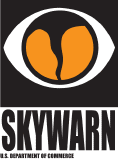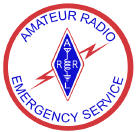
[HOME]
| Hi, my name is Greg Johnson and I am an Amateur Radio Operator. I have been one for about 2 years now an am enjoying it more every day. Soon after I became a ham I got into three different groups that relate to each other. | ||||||||||||||||
|
SKYWARN |
||||||||||||||||
 A group
called Skywarn which is part of The National Weather Service (NWS).
I participate both in running nets during severe storms, and also in
providing reports back to the NWS via Skywarn. I also run there web
site. (http://www.centralcarolinaskywarn.net)
Since we have a call up list and thus it takes time for them to come back
around to me, that means during most storms I do not have to be sitting in
my ham shack. And since I always feel like a caged cat in my
apartment during a storm, just like cats, I prefer to be outside. So
since I am driving around during a storm, I patrol the Northern Cary,
Southern Morrisville, and North Western Raleigh area to provide reports
from the field. A group
called Skywarn which is part of The National Weather Service (NWS).
I participate both in running nets during severe storms, and also in
providing reports back to the NWS via Skywarn. I also run there web
site. (http://www.centralcarolinaskywarn.net)
Since we have a call up list and thus it takes time for them to come back
around to me, that means during most storms I do not have to be sitting in
my ham shack. And since I always feel like a caged cat in my
apartment during a storm, just like cats, I prefer to be outside. So
since I am driving around during a storm, I patrol the Northern Cary,
Southern Morrisville, and North Western Raleigh area to provide reports
from the field.
Then third we have the population. We have tooooooo many people on the road, and most of them can't drive when there is even a drop of rain falling. So all I can do is patrol around using technology as a guide.
In general, it has 3 independent communications systems operating on 4 separate bands, 3 GPS navigation systems, a manual navigation system backup, a weather station, and additional lighting. It also currently has signs on it advertising Central Carolina Skywarn which is the local branch of Skywarn in my area. Soon I hope to add signs for ARES and Amateur Radio in general. For a more detailed description of my truck, go to my truck detail page. |
||||||||||||||||
| ARES | ||||||||||||||||
 I also
participate with a group called ARES (Amateur
Radio Emergency Service). When there are widespread disasters
where local, county, or even state communications systems go down, ARES
steps in to provide life-saving communications ability to the Emergency
Services. The fact is that not even the federal government could
afford to create a communication system with such a wide coverage area as
Amateur Radio does. And this is because to any individual entity,
the cost of such a system would be impossible. But with Amateur
Radio, you are not limited by being an individual entity. Instead
the communications system is a contributions of millions of people
nationwide. I also
participate with a group called ARES (Amateur
Radio Emergency Service). When there are widespread disasters
where local, county, or even state communications systems go down, ARES
steps in to provide life-saving communications ability to the Emergency
Services. The fact is that not even the federal government could
afford to create a communication system with such a wide coverage area as
Amateur Radio does. And this is because to any individual entity,
the cost of such a system would be impossible. But with Amateur
Radio, you are not limited by being an individual entity. Instead
the communications system is a contributions of millions of people
nationwide.
When all other lines of communications fail, Amateur Radio is still there. So when Hurricanes hit in this area, I always take as many shifts as I can at various locations providing communications. |
||||||||||||||||
|
PUBLIC SERVICE |
||||||||||||||||
 I also do a
lot of volunteer work for what we call public service events. These
are events like charity bike-a-thons, or walk-a-thons where you may have
1000s of people involved and need a communication system that can operate efficiently.
Most people can use a cell phone, or even a walky-talky. But when
you get one of these events that is so wide sweeping you run into
problems. I also do a
lot of volunteer work for what we call public service events. These
are events like charity bike-a-thons, or walk-a-thons where you may have
1000s of people involved and need a communication system that can operate efficiently.
Most people can use a cell phone, or even a walky-talky. But when
you get one of these events that is so wide sweeping you run into
problems.
The entire area of the event may not be covered by other communications systems do to placement of fixed towers that are needed, or because of the low power signals non-amateurs are limited to. Also there is the fact that if you are on the phone with someone about needing more toilet paper, someone who needs the ambulance can't get though to you. Then there is also the fact that the event coordinators often consider communications devices as second priority, and they are so busy they rarely get to second priority items.
This is where the Amateur Radio operator steps in. We can create our own communications system to provide coverage over the entire area of an event. We can do this because we have equipment in better positions and can operate on higher power. Since communications are done in a way where there is not a continuous connection between two people, that means that other people with emergencies can break into the conversation. And to keep everything running efficiently we run what is called a net. Basically think of 2-way radio as a typical road intersection with out any stop signs or stop lights. As long as there are just a few people at any one time and they know the intersection has no stop signs, they can operate in such a way to avoid problems. But when you have lots of people going through that intersection, you need something or someone to act as a traffic cop to guide traffic. A net is basically when one person is elected to act as a traffic cop to control the communications "traffic" so that emergencies are able to take priority over regular coordination "traffic" and to prevent non-relevant conversations from interfering with the rest. It is this ability to create a wide spread, highly organized communications system even in the worse situations with little to no warning that make us so valuable. |
||||||||||||||||
© 2001 Greg Johnson, all rights reserved.
Greg Johnson; [email protected] •
WebOne Creations • 3535 South Wilmington St. Raleigh, N.C. 27603